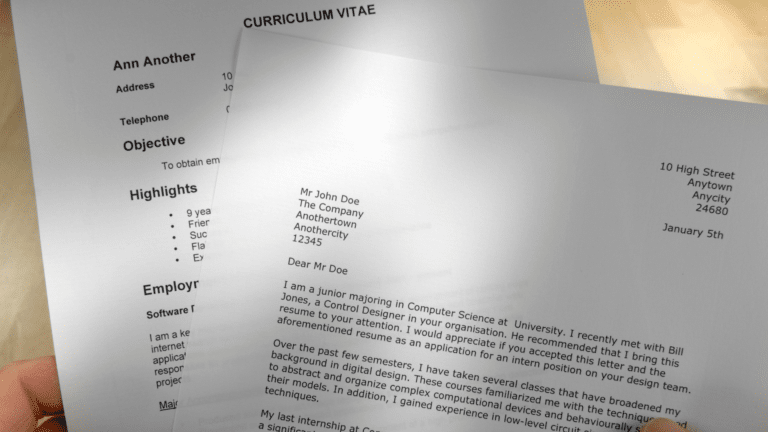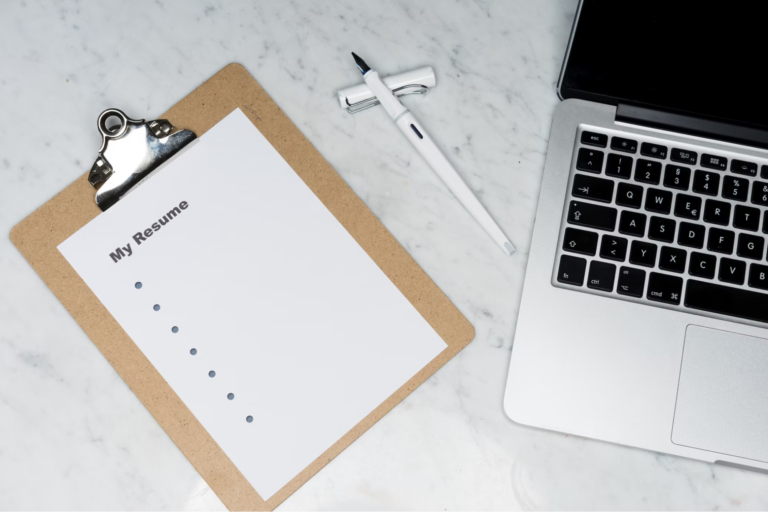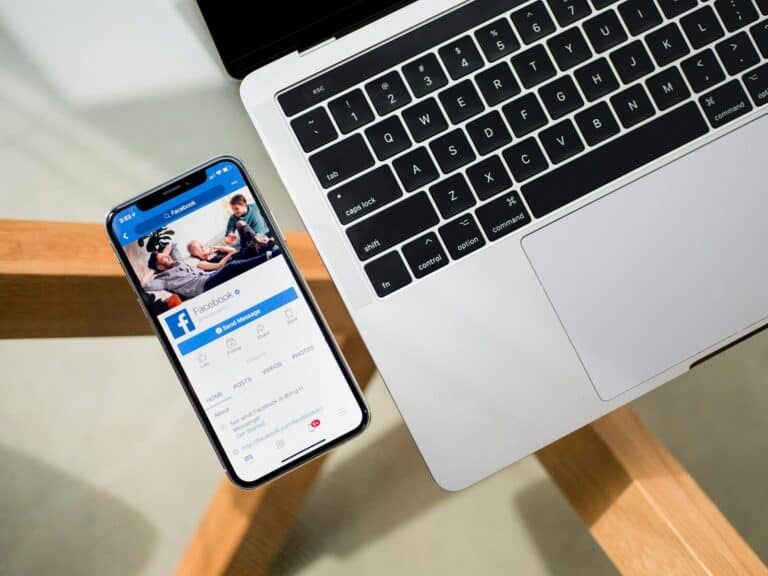You just got an invitation for an interview, and to prepare, you’ve rehearsed answers to the most common interview questions and done your research on the company. But towards the end of the interview, the roles will briefly switch, and the interviewer will ask you, “Do you have any questions for us?”
This might seem daunting, but asking an interviewer questions is probably much easier than you think. The main purpose of this part is for them to see whether you’re interested in the position or not, so it’s best to prepare beforehand.
So, we’ve gathered what we know from our professional experience and created this guide to help you understand why employers ask this question and how you can easily prepare for it.
Key Takeaways
- When employers ask you whether you have any questions for them, they want to know whether you’re interested in learning more about them and the company, as this tells them how serious you are about the opportunity.
- Therefore, carefully pick the questions that are very specific and show your interest in the role and the company.
- Recruiters sometimes ask, “Do you have any questions for us?” to check how attentive you were throughout the interview process.
- Avoid asking questions about vacation and salary. These questions are better asked later on during the hiring process.
Why Are Employers Asking, “Do You Have Any Questions for Us?”
Employers will ask you whether you have any questions for them because they want to know whether you:
- Wish to know more about the company
- Paid attention throughout the interview
- Came prepared
- Want to see if the company is the right fit for you
- Are interested in the job
Additionally, employers want to know what information about the job you prioritize over the rest, which essentially signals your values. That’s why asking the right questions is crucial.
Try to ask the interviewer some thoughtful questions that show the employer that you’ve thought about what it would be like to work for them.
How to Answer “Do You Have Any Questions for Us?”
Let’s first take a look at some steps you need to take before answering this question:
Prepare in Advance
Take some time to prepare sample questions for the interviewer. Make a list of those that can extract the information that has the potential to impact your eventual decision whether to join the company the most.
These questions can be about:
- The position
- The employer
- Responsibilities and expectations of the role
- The company culture
There will be more on what questions you can ask later on, so keep reading.
Research The Company
The next step is researching the company. When you look it up, you should be able to get a clear understanding of the company’s accomplishments, history, values, and main mission.
You can start by looking through the company’s website or looking up any articles written about them. You can then use this information to form some more detailed questions.
Researching the company is also a great way to show the employer that you took some time to learn more about them.
Memorize The Questions
Practice each question before your interview. This way, it’ll be easier to memorize them.
Another great tip that can help you remember the questions is to think of the interview as a conversation you’re having with a friend. This is also a great way to remain confident and comfortable throughout the interview.
Ask Open-Ended Questions
Ask questions that would make the employer give a detailed explanation. This is a good way to keep the conversation going. You’re also more likely to get the answer you want by asking open-ended questions.
If you were to ask simple questions that they could only answer with a short yes or no, you’d get no real information out of the conversation.
Shift Strategy During the Interview
Although it’s really important to focus on preparing questions, it’s also crucial that you listen carefully during the interview.
This is because some questions that you prepared might have been answered during your talk with the interviewer. Active listening is also a good tool to figure out new questions based on what you’ve discussed.
Know The Right Time and Place
There’s always a time and place to ask certain questions, such as about your salary and vacation. Asking tricky questions can create an awkward atmosphere, so it’s best to focus on asking those about the job and the position.
Sample Questions You Can Ask the Interviewer
The questions you ask will also depend on who your interviewer is. Your interviewer can either be a recruiter, HR representative, management representative, or hiring manager. So, it’s a good strategy to tailor your questions to your interviewer.
Besides that, it’s also important to figure out what you want to know, so let’s have a look at some of the best answers based on the question type.
Note: If you get asked, “Do you have any questions for us?” as a fresher, all of these apply to you as well.
Questions to Ask About the Role
When the recruiters ask you, “Do you have any questions about the role?” here’s what you might want to ask:
- What does a typical day look like for an IT manager?
- What goals do you expect me to reach in the first six months?
- How has this role helped the company grow and prosper?
- What are some of the responsibilities of this role?
- When can I expect my first evaluation?
- What are some ways you conduct performance reviews for this role?
- What would you say is a good step to take in order to reach success in this role?
Questions to Ask About the Company or Department
These questions show that you’ve done research on the company.
You can try asking:
- Why do you personally like working here?
- How would you describe the company in three words?
- Where does the management see the company in five years?
- What has the company recently accomplished?
- What challenges has the company recently faced?
- What management style does the company nurture?
- What motivates you to come to work every day?
- Can you tell me something about the company’s culture?
Questions to Ask About the Qualifications
These questions are a great way to emphasize how your qualifications and skills can be aligned with the role.
You can ask questions such as:
- What are some qualities that you’re looking for in a candidate?
- Would my skills and accomplishments benefit your company?
- What are some qualities that your most successful employees have?
- Do you have any questions about my experience section?
- Do you have any concerns about whether I’d be a great fit for the company?
Questions to Ask About the Next Steps
These questions can help you learn more about the hiring process and whether you can expect to hear from them.
You can go for:
- Thank you for making time for me today. What are the next steps now?
- I appreciate every detailed explanation you’ve given me. When could I expect to hear back from you?
- I’ve really enjoyed learning more about this opportunity. What are the next steps in the hiring process?
- What does the onboarding process look like?
Additional Questions
There are plenty of other questions you can ask that cannot be put into the same category.
Some of these are:
- Are there any options for working remotely?
- Do you have any part-time options for this position?
- How long do people usually work for this position?
- Are there any advancement opportunities?
- Do you provide any training?
- Do you work overtime?
What Questions Not to Ask
There are definitely some questions that you should steer clear of at all costs.
Here are a few that you should avoid:
Personal Questions
Although it’s admirable that you want to know more about the employer, it’s best to avoid asking personal questions. Just because you feel comfortable doing so doesn’t mean the employer does as well. To be safe, avoid asking questions such as “Are you married?” or “Do you have any children?”.
Confidential Information
Most companies have specific rules on what information their employers are allowed to share. That’s why it’s best to avoid asking about any of the company’s confidential information. These can be questions such as, “Are there clients with whom you haven’t publicly disclosed your relationship?” or “Can you share a project you’ve recently worked on?”
Outside-of-Work Activities
In theory, wanting to know more about your coworkers and getting the chance to socialize off-work is a nice idea. However, it’s not a good idea to ask about such activities during your interview.
This might prompt the employer to think that you’re not interested in the work itself. So, try to avoid questions like “When can we go out for drinks?”.
Benefits and Salary
Although it’s completely fine to ask about your salary, it’s best to do so during the other stages of the hiring process. Asking questions like “What is my compensation for this role?” and “What are the benefits for this role?” on the first round of the interview will make you seem too greedy.
Final Thoughts
If your interview is coming up, it’s always a good idea to do some preparation beforehand. This can be anything from preparing an outfit or sample answers to common interview questions to preparing questions you can ask the interviewer.
It’s best to focus on asking questions that can help you extract more information on the company and the role. On the other hand, it’s best to avoid asking any personal questions or inquiring about your salary and vacation days right away. This can be asked a bit later on!
With that out of the way, we hope this guide has helped you prepare for your next interview, and we wish you good luck in the hiring process!












